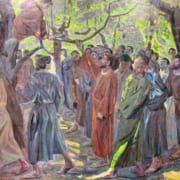The Elevator of Faith is Boring
For we walk by faith, not by sight.
2 Corinthians 5:7
Part of my day is reading and more reading. Mostly to find how other people think about faith, and to find interesting and helpful historical Christian facts. All to pass on to other people to help them have a closer walk with God. While doing this recently, I came across an article named, My Boring Christian testimony. As I read the article I was anything but bored. Essentially, the testimony was written by a woman named Megan Hill, a married mom, and writer. The point of the article was that she didn’t feel her faith was real because she didn’t have a dramatic conversion process or an incredible faith story.
As I read the article, I discovered a very normal life. As a young person, her parents took her to church. She asked to join the church when she was twelve. As she entered college, when most young people drift away from the church, she continued going to church. After marriage and having children, she started the same cycle with her children, by taking them to church. It seems pretty normal, certainly nothing to be ashamed of.
But through the years she doubted if her faith was real. She saw other people have dramatic moments of faith. She heard wonderful testimonies of people curing their addictions through faith. Others who had led an immoral life were struck by God and saved. On and on this drumbeat went, leaving her to feel if she had done something wrong.
Her real problem was in not understanding 2nd Corinthians 5:7, where it says, For we walk by faith, not by sight. She had always walked by faith, while many of us got off course by walking by sight and then needed to have a dramatic event to turn our lives around.
She had answered life’s most important question correctly, early in life, while many of us did the opposite and answered the question wrong.
This statement in 2nd Corinthians is a fundamental statement about faith. It isn’t something you can touch, see, hear, taste or physically feel. Faith is the opposite, it’s like walking into a dark room and being sure you won’t bump into anything.
For someone, like Megan, it’s like having the option of walking into a building and walking up all the stairs to get to the top; or just hitting the button on the faith elevator and arriving on top. It doesn’t mean she took a short cut or had a boring journey on the faith elevator. It meant she answered life’s toughest question right the first time.
Some of us choose to walk up, because we don’t see how it’s possible to just believe. For some it is a lifetime of a tepid prayer life, until the overwhelming responses from God turns a person’s heart.
For others, it is a point in life where they had no place to turn. They had hit the 6 o’clock of life and were left desperate. Only then do they make the long walk back to faith.
Still, others are sometimes in and sometimes out. The glory of God’s blessings don’t fully outweigh their human desires. They are constantly pulled back by a new want in life.
For these people, they take the stairs up to the top of the faith elevator, stopping along the way to investigate the floors. Sometimes they look at every floor, other times skipping a few.
But faith is believing in something you can’t see. You can’t rationalize faith. And no one can ever adequately explain how you are supposed to feel.
C.S. Lewis explained his faith and conversion experience by saying the following; You must picture me alone in that room in Magdalen [College, Oxford], night after night, feeling, whenever my mind lifted even for a second from my work, the steady, unrelenting approach of Him whom I so earnestly desired not to meet. That which I greatly feared had at last come upon me. In the Trinity Term of 1929, I gave in, and admitted that God was God, and knelt and prayed: perhaps, that night, the most dejected and reluctant convert in all England.
Faith is no more than an intimate encounter with God when you fully realize that God exists. A realization that leaves you grateful and fulfilled. No longer desiring things you want, but to be a humble servant of God.
Faith isn’t something you can will or force. Sometimes it is a persistent knocking on the door by God. Other times it is a dramatic event. But God is always compelling us to believe. Compelling us to take one more step into the unknown and walking one step away from what we know.
But because some answer the compelling force of God on the first try, it doesn’t mean they are missing something, like Megan felt. Many people have a simple faith. I admire people with a boring journey to God. They saved themselves a lot of trouble.
But is Megan’s testimony really boring? How can it be, when you consider the power and beauty of a direct connection God? Her own personal and intimate relationship with the one who created the earth, the universe, the stars in the sky and even knitted us in our mother’s womb.
No, Megan, your faith isn’t boring!
Listen to the Full Podcast –The Elevator of Faith is Boring
Blessings, until next time,
Bruce L. Hartman
Photo by Aaron Burden on Unsplash
We love giving credit to budding photographers to help them gain more exposure.










